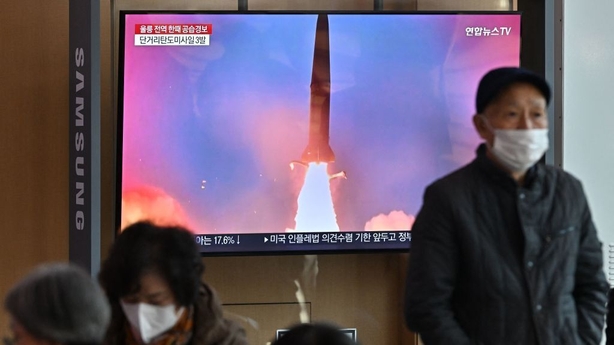North Korea fired at least one "unidentified ballistic missile" Seoul's military has said, with Tokyo saying it appeared to have flown over Japan, as they urged residents in some areas to take shelter.
"North Korea fires unidentified ballistic missile towards East Sea," Seoul's Joint Chiefs of Staff said, referring to the body of water also known as the Sea of Japan.
The launch comes a day after Pyongyang fired more than 20 missiles, including one that landed near South Korea's territorial waters.
Local media reported that air raid sirens had gone off on South Korea's eastern island of Ulleungdo - where residents were warned on Wednesday to seek shelter after one of Pyongyang's short-range ballistic missiles crossed the de facto maritime border.
Tokyo also confirmed the Thursday launch, with the Japanese government issuing a special warning to residents of northern regions shortly before 8 am (2300 GMT), telling them to stay indoors or seek shelter.
The Yonhap News Agency reported the launch was believed to be of an intermediate or long-range missile.
Given the missile was "accompanied by evacuation warnings, strongly suggest IRBM or possible ICBM on full-distance launch," said Chad O'Carroll of Seoul-based specialist site NK News.
"Latter could be very worrying for some if it successfully goes a significant distance."
On 4 October, North Korea fired a missile over Japan that also prompted evacuation warnings. Pyongyang later claimed it was a "new-type ground-to-ground intermediate-range ballistic missile".
That launch was the first time North Korea had fired a missile over Japan since 2017.
Pyongyang later claimed the launch and a blizzard of other tests around the same time were "tactical nuclear drills" that simulated showering South Korea with nuclear-tipped missiles.

Blitz of launches
Pyongyang's multiple missile launches came as Seoul and Washington staged their largest-ever joint air drills, dubbed Vigilant Storm, which involved hundreds of warplanes from both sides.
Pyongyang has called the exercise "an aggressive and provocative military drill targeting the DPRK," and warned that, if it continues, Seoul and Washington will "pay the most horrible price in history."
President Yoon Suk-yeol said the North's flurry of missiles was "effectively a territorial invasion".
Pyongyang also fired an artillery barrage into a maritime "buffer zone" that experts said was part of an "aggressive and threatening" response to the joint US-South Korean air drills.
One short-range ballistic missile crossed the Northern Limit Line, the de facto maritime border, prompting the rare warning for residents on the island of Ulleungdo to seek shelter in bunkers.
South Korea, for its part, said it fired three air-to-ground missiles into the sea towards the north of the two countries' maritime boundary.
South Korea also closed some air routes over the East Sea, advising local airlines to detour to "ensure passenger safety in the routes to the United States and Japan".
North Korea revised its laws in September, with leader Kim Jong-un declaring the country to be an "irreversible" nuclear power - effectively ending negotiations over its banned arms programs.
Washington and Seoul have repeatedly warned that Mr Kim's recent missile launches could culminate in another nuclear test - which would be Pyongyang's seventh.
"These are North Korea's pre-celebration events ahead of their upcoming nuclear test," Ahn Chan-il, a North Korean studies scholar, told AFP.
"They also seem like a series of practical tests for their tactical nuclear deployment."
Outraged by aggressive and irresponsible behavior of #Pyongyang firing missiles over a maritime border with #SouthKorea
— Charles Michel (@CharlesMichel) November 2, 2022
On behalf of the EU, I express solidarity with #Korea and other countries in the region @President_KR
European Council President Charles Michel earlier condemned North Korea's "aggressive" firing of missiles and voiced support for South Korea.
"Outraged by (the) aggressive and irresponsible behaviour of Pyongyang firing missiles over a maritime border with South Korea," Mr Michel wrote on Twitter.
"On behalf of the EU, I express solidarity with (South) Korea and other countries in the region."
The United States also condemned the move, calling one missile's trajectory across the South Korean maritime boundary particularly "reckless."
"We condemn these missile launches and the DPRK's reckless decision to fire a missile below the de facto maritime boundary with the Republic of Korea," said White House national security spokesman John Kirby, referring to North and South Korea's official names, respectively.
Mr Kirby said the missile launches did not pose any "immediate threat" to the United States or US personnel in the region.
However, he said, "these launches just underscore the need to make sure that we have the appropriate military readiness in and around the region."
US officials have said for months that Pyongyang is poised to undertake its first nuclear weapon test after a five-year hiatus.
Mr Kirby said the United States continues to leave the door open to talks on denuclearizing the Korean peninsula, but Pyongyang has not responded and Beijing is not helping.
